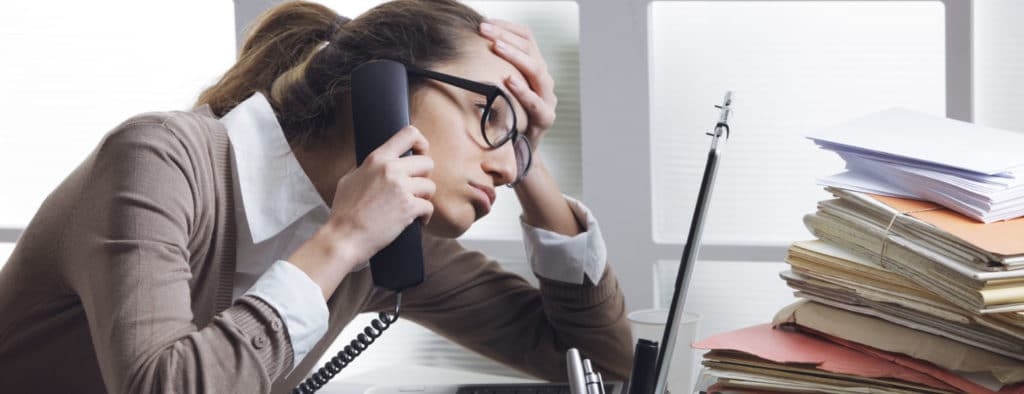
Anxiety is a normal human emotion, designed to keep us safe from danger. However, it can cause problems when it’s particularly severe, long-lasting and has an impact on our day-to-day life. For many people, a common source of stress and anxiety in their life is work, therefore birthing the term ‘work anxiety’.
Signs of work anxiety
Every morning is a struggle
Your alarm clock goes off and a feeling of dread/anxiety overcomes you. Unsurprisingly this is a clear sign that there’s a problem.
It’s entirely normal to wake up on the morning of a big presentation feeling anxious. But when it’s every morning and simply based on the fact that you’re going into work today, it’s time to seek help, as you might be experiencing work anxiety.
Whilst leaving your current job may solve the immediate issue, is it possible that doing the same job at a different company could lead to the same anxiety. It’s always worth seeking advice before making big decisions.
Your physical health is inexplicably deteriorating
We are joined at the neck, and our mental and physical health are inseparable. Work anxiety can manifest in a decline in our physical health. If you’ve noticed that you feel under the weather a bit more or you just can’t shake a cold like you normally can, this can be a warning sign.
Inability to motivate yourself
We all lack motivation at times. But if there comes a point where this becomes persistent and really interferes significantly with routine daily tasks, there could be a problem with work anxiety.
Struggling to concentrate or complete tasks by a deadline
When we are experiencing high anxiety, our mind is elsewhere, which can make it much more difficult to focus on tasks. This can lead to procrastination and in some cases missing deadlines.
You are regularly experiencing the physical symptoms of anxiety
This can include a racing heart, feeling jittery or jumpy, sweating, dry mouth, tremors and shaking or feeling like there is a lump in your throat. These are signs that your body is going into fight or flight mode, a core part of work anxiety.
You are experiencing sleep issues
Having problems sleeping is a common symptom of work anxiety. This could be trouble falling asleep or staying asleep, as well as tiredness or fatigue in the daytime.
Overreacting to situations
High anxiety can put us in a state of heightened awareness and feeling particularly on guard. At work this can manifest as outbursts or overreacting to situations that we normally wouldn’t.
What causes work anxiety?
Work anxiety can be caused by a variety of different factors, and it’s usually the combination of these that make us feel overwhelmed and anxious.
- Starting a new job
- Leaving an old job
- Lack of job security
- Dealing with workplace bullying or interpersonal conflicts
- Facing deadlines that are too short or conflicting with other deadlines
- Regularly having days that are unpredictable
- Working in a fast-paced or competitive environment
- Feeling a lack of control in the work environment
- Having a lack of direction on tasks
- Working long hours or shifts
- Feeling undervalued (low pay, benefits, lack of praise)
- Having a demanding boss
- Experiencing a workload that is overly high
- Feeling you lack the skills or knowledge needed to do the work
What are the effects of work anxiety?
- Experiencing reduced job performance and quality of work
- Noticing effects on personal life
- Feeling like you don’t have a life outside work
- Problems with concentration, fatigue, tiredness and irritability
- Turning down opportunities due to phobias (e.g. fear of flying or fear of public speaking)
- Having reduced job satisfaction
- Reduced confidence in your skills
- Feeling like what you do doesn’t make a difference
- Taking fewer risks and more likely to plateau in your career
- Developing clinical levels of anxiety – an anxiety disorder
- Seeing effects on the organisation if you are an executive
- Planning less effectively
- Avoiding innovation
How to cope with work anxiety
Whilst work can be scary, coping with anxiety at work is possible. Below are some tips to help you manage work anxiety:
Tell a co-worker
Having someone at work who knows what you are going through can help you feel more socially supported, which can lower levels of anxiety and stress. Whilst you don’t need to tell everyone that you are feeling anxious about work, it can be helpful to talk to key people about it. This could be a trusted colleague, a friend or even a Mental Health First Aider if your organisation has them in place.
Tell your employer
Many people’s tendency might be to shy away from opening up to their manager or employer about their work anxiety, for reasons including:
- Concerns of what it might mean for their day-to-day work life
- Fears of it limiting career progression or competency being called into question
- Perceptions that it is a sign of weakness
- Not wanting to be excluded from social groups within the workplace
- Worries that you will be subject to bullying, or the opposite end of the spectrum, over-compensating and special treatment
In fact, speaking to someone in your organisation about anxiety or depression can be one of the most useful things you can do, as it allows them the opportunity to provide you some support. Initially it is helpful to speak to your line manager or HR representative to get a better sense of what support your employer can provide. This can include:
- Reasonable adjustments, such as adjustments of duties, a quiet place to retreat to or time to attend therapeutic sessions.
- Workplace referral schemes that include counselling, such as an Employee Assistance Program (EAP).
- Some workplace may have mental health champions or Mental Health First Aiders who can help at difficult points.
Develop work boundaries
Getting to know your limits and learning to work within them is important for managing work anxiety. This might mean:
Focusing on a single task at a time – as humans we are not designed to multitask, and doing so can quickly lead us to feel overwhelmed and anxious. So choose one task, and focus entirely on that before moving onto the next.
Prioritise tasks – to help you focus on one task at a time, prioritise work tasks so you can work on the most important or urgent. If this is difficult it is a good idea to work with your manager or supervisor to help you prioritise, so you know what needs to be done first and what can wait until tomorrow or next week.
Setting small frequent dealines – to keep yourself focused and on-track, and to prevent yourself from thinking too many moves ahead. It can be useful to break large tasks down into small manageable steps, especially if they feel insurmountable.
Use quick coping strategies
Tackling the larger issues that are making you feel work anxiety is important, it can also be helpful to practice quick-working coping strategies that can be used in difficult moments when you feel overwhelmed or anxious.
Go for a short walk – exercise releases endorphins which are hormones that makes us naturally feel good. It also helps us burn off excess energy that can lead to anxiety. Going outside for a walk can be even better as breathing fresh air can improve brain function, and help us deal better with anxiety and stress.
Practice a quick breathing exercise – such as breathing in through the nose and out throught the mouth for a few breaths
Watch a funny video – humour is a great antidote to work anxiety. Make the most of the technology we have available and search for a funny video to quickly feel less anxious.
Listen to a calming song – music is a fantastic healer and useful tool to change our internal state. Find a calming song you like and take a few minutes out to listen to it, or go one step further and create a calming playlist for those moments when you need a quick way to cope with work anxiety.
Take a short break and chat to a colleague – humans are social animals by nature. Find a colleague or friend you trust and have a conversation with them.
Try meditating – setting aside a few minutes during the day to do a short guided meditation or practice mindfulness can help you manage unwanted feelings of anxiety at work.
Distraction Techniques – can help shift our focus away from anxious thoughts. There a many distraction techniques, but a simple on is to count 5 blue objects you can see, then 4 green, then 3 red.
Lifestyle tips to reduce anxiety
Reduce caffeine – Caffeine is a stimulant – which can be bad news for someone with work anxiety. Caffeine can wake us up and make us feel more alert, but it can also leave us feeling jittery, anxious and have a negative impact on our sleep. If you’re feeling anxious at work, try cutting back on caffeine to see if it helps.
Develop a mindfulness or meditation practice – mindfulness helps you learn to sit with difficult feelings without analysing, supressing or reacting to them. When you allow yourself to feel and acknowledge your worries, irritations and anxieties, this often helps them dissipate.
Practice good sleep hygiene – not getting enough good quality sleep can leave us feeling frazzled and anxious at work. To get better sleep, consider practicing good sleep hygiene, such as making sure you get sufficient sleep time, turn off screens an hour before bed and avoid caffeine later in the day.
Exercise regularly – exercise releases endorphins that help us to feel good. It also raises our core body temperature which in turn lowers inflammation, which can make us feel less depressed and anxious. It’s best to find an exercise that works for you and fits around your lifestyle, this could be visits to the gym, running or cycling or even practicing a sport.
Reduce alcohol – it’s common for people to turn towards a drink to help them feel calm. Sadly this effect is short-lived and in the medium to long run, alcohol can make us feel more anxious, as well as disrupt our sleep. If you find you’re drinking too much, it’s a good idea to cut back to see if it helps with anxiety.
Treatment
The good news is there are a number of different treatments that can be effective for work anxiety:
Cognitive Behavioural Therapy – is based on the concept that your thoughts, feelings, physical sensations and actions are interconnected, and negative thoughts and feelings can trap you in a vicious cycle. It helps you deal with overwhelming problems in a more positive way by breaking them down into smaller parts. There is a wealth of evidence that CBT is an effective treatment for a wide range of anxiety-related issues.
Hypnotherapy – uses guided relaxation, intense concentration and focused attention to achieve a state of greater state of calm, and reduce feelings of anxiety and stress.
EMDR – is a psychotherapy that enables people to heal from the symptoms and emotional distress that results from disturbing life experiences. In some cases this can be useful tool to help us let go of traumas that might be making us feel anxious at work.
Medications – There are a number of different medications prescribed to reduce and stop work anxiety. The type of medication as well as length of treatment will depend on the individual as well as the issue, but can include medications such as Selective Serotonin Reuptake Inhibitors (SSRIs) as well as anti-anxiety medication.












